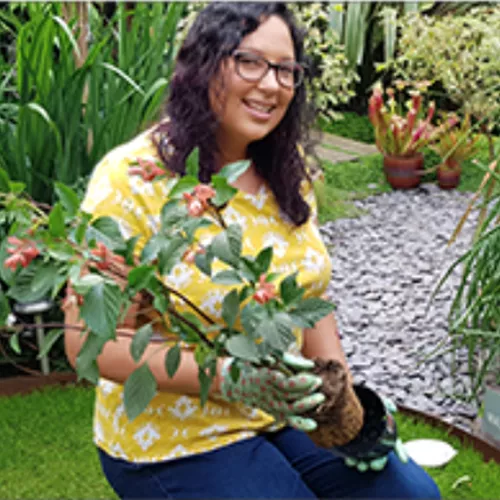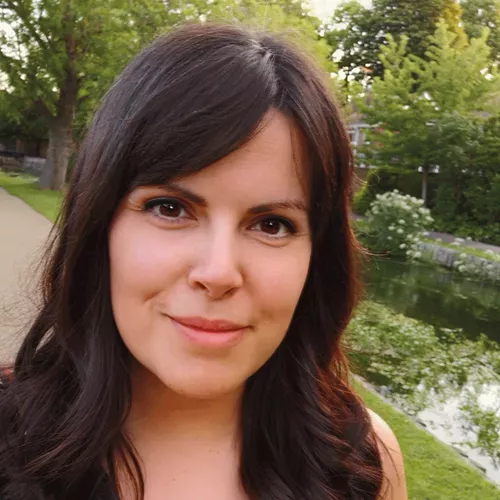How to improve your mental wellbeing
Explains what mental wellbeing means, and gives tips to help you take care of your mental wellbeing.
Download as an Easy Read PDF (new window)
What is mental wellbeing?
Mental wellbeing doesn't have one set meaning. We might use it to talk about how we feel, how well we're coping with daily life or what feels possible at the moment.
Good mental wellbeing doesn't mean that you're always happy. Or that you're unaffected by your experiences.
Having good wellbeing doesn't always mean that you don't have a mental health problem. You may live with a mental health problem, but have good wellbeing right now. Or you might not have a mental health problem, but be struggling with your wellbeing at the moment.
And poor mental wellbeing can make it more difficult to cope with daily life.
I had to make room to be well. Sounds daft but give yourself some space – in my case I used mindfulness to help me gain control.
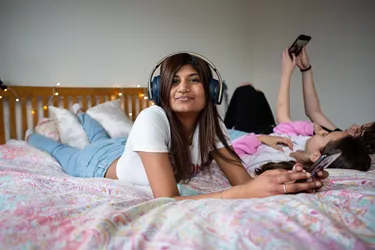
Under 18? We have resources for you on wellbeing, self-esteem and looking after yourself
Tips for improving your mental wellbeing
There are lots of things we can try to do to take care of our wellbeing. We have tips to help you:
- Try to relax and reduce stress
- Find ways to learn and be creative
- Spend time in nature
- Connect with others
- Look after your physical health
- Try to improve your sleep
- What if these tips don't help?
It's not always easy to take care of our wellbeing. Or know where to start. You might find it helpful to:
- Only try what feels comfortable
- Give yourself time to figure out what works for you. Different things work for different people
- Go at your own pace
- Take it step by step. If the first step feels too hard, try to break that up into even smaller steps
Remember that good days for your wellbeing won't always look the same. We don't always have the same levels of energy or motivation. Be kind to yourself and do what feels right for you at the moment.

Writing my way through anxiety and depression
It was like having a conversation with myself; working my way through whatever problems were bothering me at the time.
Try to relax and reduce stress
Find ways to relax
Try to think about what might help you to relax. If there's something that helps you, try to find time to fit it into your day. For example, this could be having a bath or shower. Or going for a walk or listening to music. If you find it difficult to switch off, you could try some of the tips and exercises in our relaxation pages.
Take a break if you need to
If you're feeling overwhelmed by a stressful situation, try to take a break. A change of scene may help you to relax and relieve feelings of anxiety, even just for a few minutes.
Do something you enjoy
Try to make time to do an activity you like on a regular basis. This could be cooking a meal, getting in touch with a friend or watching TV.
Try to manage stress
If you're under a lot of pressure, you may start to feel overwhelmed or out of control. Stress can also cause physical effects on our bodies.
See our pages on stress for tips on dealing with pressure and coping with stressful events.
Focus on the present
Paying attention to the present moment or your senses can be helpful. This is sometimes called mindfulness. You can use techniques such as meditation or breathing exercises. Or you can practise mindfulness by paying more attention to your senses while doing things you do each day, for example, while washing up or eating.
It's been shown that focusing on the present can help people become more aware of their thoughts and feelings. This means that instead of being overwhelmed by your feelings, it may become easier to manage them.
Our pages on mindfulness have more information. It may help you decide if it's right for you. And there's some exercises you could try.
Make a self-care kit
It may help to put together some things that could help you when you’re struggling. A self-care kit is filled with things that normally comfort you and help you relax. For example, you could include your favourite book, pictures or photos, a stress ball or fidget toy and a comforting blanket or slippers.
Or you could make a digital self-care kit on your phone. You could save photos, music, videos, messages or sayings that you find helpful. Or notes to remind yourself how to manage difficult situations.
Take care online
There's lots on the internet that may affect our wellbeing. You may find that you're spending more time online than you'd like. Or that it's making your mental health worse. It could help to take breaks from the internet. Or change the accounts you follow or websites you visit. Our pages on looking after your mental health online have more information. This includes tips on getting a good online/offline balance.
We also have tips on coping with distressing events in the news.
Eight relaxation tips for your mental health
Watch our animation for eight relaxation tips to help you look after your mental wellbeing.
Mental health apps
There are various apps available that you could use to help yourself day-to-day. But it's hard to know which ones are worth trying. Would you like some recommendations? We've put together a library of safe apps that meet our high quality standards.
Find ways to learn and be creative
Join a class or group
Learning a new skill in a group can be enjoyable, and help boost your confidence. To find out what's on in your area, you could contact your local Mind. Or ask at your local library or community centre.
Try online learning
You may also be able to learn new skills or join clubs online. This could be a good option if it's difficult to get out and about.
See the FutureLearn and OpenLearn websites to find free online courses.
Try doing something creative
You may find it helpful to do something creative, like drawing, taking photos or baking. This might help distract you from difficult thoughts or feelings. Or it may help you to understand yourself better or express difficult things in a safe way. Being creative can also feel calming or rewarding.
I find that any sort of craft activity really focuses my mind and stops me concentrating on negative thoughts. It can also be quite rewarding to actually produce something, although can have the opposite effect if things don't work out quite as intended.
Spend time in nature
Try to spend some time outdoors
Spending time in nature outdoors can help improve your mood and reduce feelings of stress and anger. Our information on nature and mental health has more about the benefits and lots of ideas you could try.
Bring nature indoors
This can give you the benefits of nature without having to go to a park or public garden. You could try listening to birdsong, looking at pictures of animals or watching nature from your window.
You could buy flowers, potted plants or seeds to grow on your window sill. Or you could collect natural materials from outdoors, such as leaves, flowers or feathers, and use them to decorate your living space.
Spend time with animals
Some people find that being with animals is calming and enjoyable. You could try pet-sitting or dog walking, feed birds from your window, or visit a local community farm.
Try a mindfulness exercise in nature
Pay attention to your surroundings and find things to see, hear, taste, smell and touch. See our information on taking a mindful moment in nature for ideas you could try.
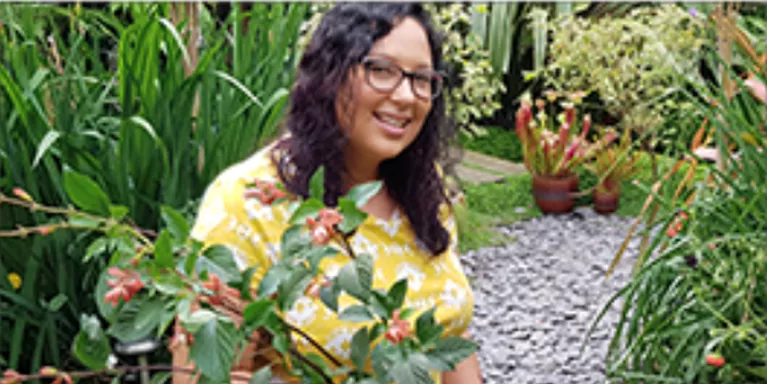
The seeds of hope
Plants and the garden won't judge me. This is where I can rebuild my confidence and become me again.
Connect with others
Connecting with others can help us have a greater sense of belonging and reduce feelings of loneliness.
Talk to someone you trust
Opening up to someone you trust can help you feel listened to and supported. It could be a friend, partner or family member. Or you could call a helpline or listening service such as Mind's infoline or the Samaritans. Sometimes just acknowledging your feelings by saying them out loud can help.
Try peer support
If you're finding things hard, talking to people who have similar feelings or experiences can sometimes help. This could be face-to-face at a peer support group, or through an online community like Mind’s Side by Side. See our pages on peer support to find out more.
Find ways to make a difference
Doing things for others can have a positive effect on our wellbeing. You could find ways to support a cause that's important to you. For example, by signing petitions, donating to charity shops or foodbanks, or showing your support on social media. We have information about how to get involved with Mind's work.
You could also try doing small acts of kindness for people you know or for strangers. This could be things like holding a door open for someone, making someone a cup of tea, or posting a nice comment or review online.
Volunteer
Using your time to help others can give you a sense of purpose, help you meet people and boost your self-esteem. Find out more about volunteering for Mind or visit the Volunteer by Do It website for volunteering opportunities.
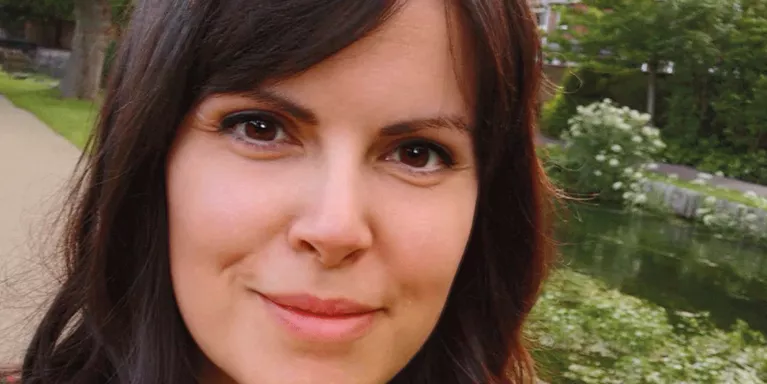
How peer support changed my life
I sat in a room full of strangers who instantly understood me more than my friends and family.
Look after your physical health
Drink water regularly
Drinking enough water or other fluids is important for our mental and physical health. The NHS has more information about water, drinks and your health.
Think about what you eat
What we eat can affect our wellbeing, including our mood and energy levels. There's lots of advice out there about which foods we should or shouldn't eat. This can feel overwhelming or confusing. Feeling guilty about what we eat can affect our wellbeing too. What works for you might not be the same as everyone else. And this can change at different times. Try to make food choices that work best for you and your situation. Our food and mental health pages have more information.
If you have a difficult relationship with food and eating, our pages on eating problems have information and tips which may help.
Look after yourself
Doing things like brushing your teeth or having a shower are important for your physical health. And they can help you feel better. If you're struggling, try to set yourself small goals or just do what you can.
Think about your drug and alcohol use
You might feel like using drugs or alcohol to cope with any difficult feelings. But in the long run they can make you feel worse. See our pages on recreational drugs and alcohol to find out more.
Try to keep active
Try to build physical activity into your daily routine, if possible. It doesn't have to be anything big. If you aren't used to being active, start off small and try to find something you enjoy.
Our pages on physical activity and your mental health have ideas for most ages and abilities. They include things you can do at home. The NHS also has a page of sitting exercises that you could try.
I aim to go for a walk at lunchtime during the working week. It gives me time to clear my head from the morning which helps prepare me for the afternoon stint. It also reminds me that I need to look after myself.
Try to improve your sleep
How well we sleep can impact our wellbeing. And if we're struggling with our mental health, this can affect our sleep. Everyone's sleep patterns are different, and it's important to do what works for you. But here are some ideas you could try:
Establish a routine
Try and establish a routine around bed time, to help set a regular sleeping pattern.
Think about your screen time
Try to give yourself some tech-free time before sleep, and avoid bright screens that can affect your sleep. Instead of looking at a screen you could try listening to some music or a podcast.
Try to wind down before bed
Do a relaxing activity, like having a bath, or try a relaxation exercise before you go to sleep. It may also help to avoid having caffeine before your bed time, as this can keep you awake.
Try to make your sleeping environment comfortable
A comfortable sleeping environment can help improve your sleep. Small changes can help. For example, you might sleep better with a low light on, or with different bedding.
If you're staying in hospital, having your own items can help make things feel more comfortable and personal. For example, you could ask to use your own pillow or blanket.
If you're living in a hostel or supported accommodation, the Groundswell website has some ideas for improving your sleep.
Try to remember that it won't last forever
Sometimes worrying about when we'll fall asleep or how many hours sleep we’ll get can make us feel even worse. Try to remind yourself that it's normal to struggle to sleep sometimes. And just lying in bed and resting can also be helpful for your body and mind.
See our pages on sleep problems for more information. And more tips to improve your sleep.
I read if I can't sleep. As well as drinking herbal tea, it helps me relax and fall asleep faster. If this doesn't help, I focus on my breathing and try and empty my brain.
What if these tips don’t help?
Our pages on different mental health problems include self-care tips and useful contacts. We’ve also got information on things that could be affecting your mental wellbeing such as money, racism and gender and sexuality.
And remember it’s ok to ask for help. See our pages on seeking help for a mental health problem for guidance on finding support and treatment for your mental health.
This information was published in July 2023. We will revise it in 2026.
References and bibliography available on request.
If you want to reproduce this content, see our permissions and licensing page.










